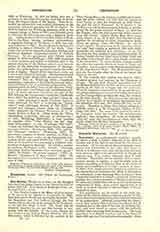

Deposition, an ecclesiastical vindictive penalty by which a cleric is forever deprived of his office or benefice and of the right of exercising the functions of his orders. Of its own nature this punishment is perpetual and irremissible in the sense that those on whom it is inflicted, even after having done full penance, have no right to be released from it, though the superior may, if he wishes, reinstate them if truly amended. Deposition can be inflicted only on ecclesiastics, secular or regular; it may be either total or partial, according as it deprives them of all powers of orders and jurisdiction or of only a portion of them. It differs from simple privation because in addition to the deprivation of benefices and offices it disqualifies an ecclesiastic from obtaining them in future; from suspension because it is always a perpetual vindictive penalty, not a mere suspension of the use of the powers of orders and jurisdiction, but an entire and perpetual withdrawal of them; from actual degradation in as much as it never deprives of the privileges of the ecclesiastical state.
This punishment can be traced to the early centuries of the Church when ecclesiastics guilty of heinous crimes were expelled from their rank and removed to lay communion. Although preserving the character of their orders, they were then considered, for all purposes and in the eyes of the law, as ordinary laymen, and were bound to appear with the ordinary faithful when receiving Holy Communion. The word deposition, it is alleged, was first used in the Synod of Agde (506, can. xxxv) to indicate such a penalty. Down to the twelfth century the expressions deposition and degradation meant one and the same canonical punishment. We know, for instance, that Paul, Patriarch of Alexandria (541), and Ignatius, Patriarch of Constantinople (861), met with the same kind of punishment; yet in the first case it is styled deposition and in the second degradation. Moreover, deposition always deprived ecclesiastics of the office they held by the ordinary title of ordination, and it was nearly always coupled with the ceremony of divesting delinquents of the garments used in the functions of their sacred ministry. In process of time, when, first by custom and subsequently by decree of Alexander III (c. At si clericis, IV, De judiciis), bishops were allowed to dispense from that penalty in crimes of lesser gravity than adultery, the solemn stripping of the sacred vestments was discontinued, to save the trouble of restoring their use in case of reinstatement. The new practice created uncertainty and variety in the execution of deposition, hence Boniface VIII (c. ii. De paenis, in VI°) at the request of the Bishop of Beziers decreed that the formal removal of vestments, which now means and effects total exclusion from the ecclesiastical state, was to take place only in cases of actual degradation.
As stated above, total deposition prohibits the exercise of powers conferred by ordination, and effects a complete and perpetual deprivation of ecclesiastical offices, benefices, and dignities. It also disqualifies from obtaining them in future, while public disgrace or infamy and irregularity are inflicted on those who disregard this punishment. The character impressed by ordination being indelible, deposition from orders can only deprive a person of the right of exercising them. Deposition from office always effects the loss of the benefice annexed to it, as benefices are given on account of the spiritual office. On the other hand, deposition from benefice never renders an ecclesiastic incapable of licitly exercising his ministry; it is maintained, however, that it deprives him even of the right to a share of the temporal emoluments for his decent support. According to the present discipline of the Church deposition is inflicted only for enormous crimes, such as cause public scandal and do great harm to religion or morals, e.g. murder, public concubinage, blasphemy, a sinful and incorrigible tenor of life, etc. It is largely left, however, to the prudent judgment of the superior to determine in each case the gravity of the crime which deserves this punishment. In fact, deposition is now rarely inflicted; simple dismissal, together with perpetual suspension, usually takes its place. (See Lay Communion.)
S.LUZIO

